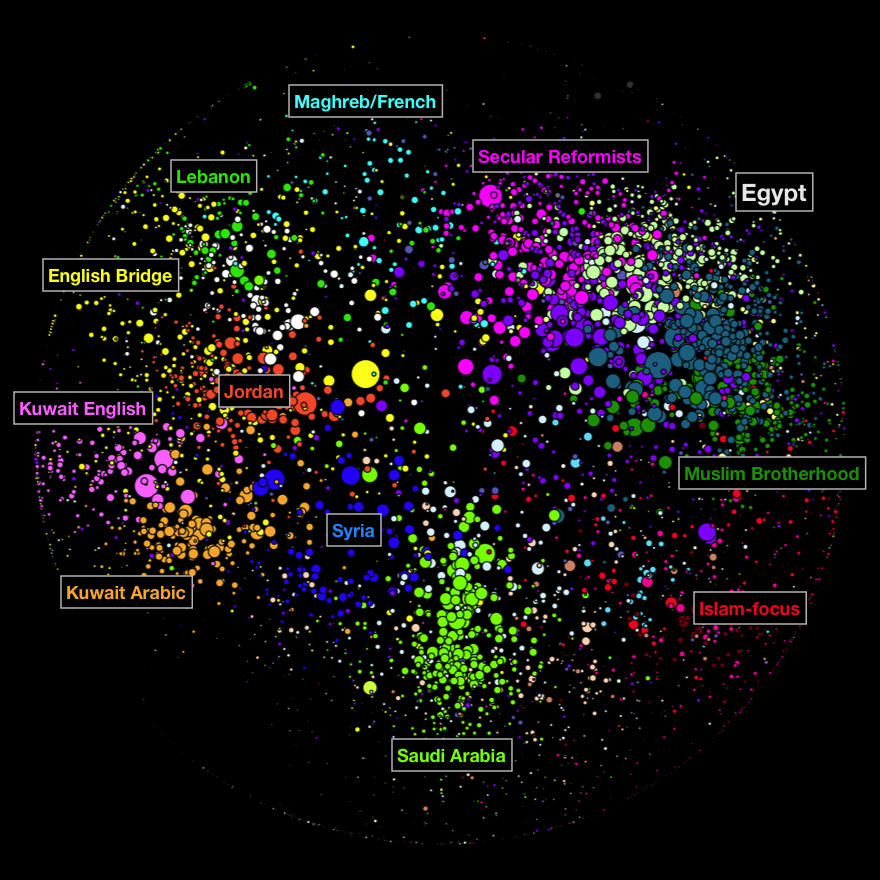Philip N. Howard: The Digital Origins of Dictatorship and Democracy: Information Technology and Political Islam (2010)
Filed under book | Tags: · 1990s, 2000s, censorship, democracy, internet, iran, islam, politics, technology

– First book to move beyond potential and hypothetical relationships between technology diffusion and democratic transitions to look at lived experiences for countries under study
– Draws on a statistical study that compares data trends across 74 Muslim countries between 1990 and 2008
– Addresses 2009 presidential elections in Iran
Around the developing world, political leaders face a dilemma: the very information and communication technologies that boost economic fortunes also undermine power structures. Globally, one in ten internet users is a Muslim living in a populous Muslim community. In these countries, young people are developing their political identities–including a transnational Muslim identity–online. In countries where political parties are illegal, the internet is the only infrastructure for democratic discourse. In others, digital technologies such as mobile phones and the internet have given key actors an information infrastructure that is independent of the state. And in countries with large Muslim communities, mobile phones and the internet are helping civil society build systems of political communication independent of the state and beyond easy manipulation by cultural or religious elites.
This book looks at the role that communications technologies play in advancing democratic transitions in Muslim countries. As such, its central question is whether technology holds the potential to substantially enhance democracy. Certainly, no democratic transition has occurred solely because of the internet. But, as Philip Howard argues, no democratic transition can occur today without the internet. According to Howard, the major (and perhaps only meaningful) forum for civic debate in most Muslim countries today is online. Activists both within diasporic communities and within authoritarian states, including Iran, Saudi Arabia and Pakistan, are the drivers of this debate, which centers around issues such as the interpretation of Islamic texts, gender roles, and security issues. Drawing upon material from interviews with telecommunications policy makers and activists in Azerbaijan, Egypt, Tajikistan and Tanzania and a comparative study of 74 countries with large Muslim populations, Howard demonstrates that these forums have been the means to organize activist movements that have lead to successful democratic insurgencies.
Publisher Oxford University Press, 2010
ISBN 0199736413, 9780199736416
285 pages
review (Evgeny Morozov)
PDF (updated on 2012-11-11)
Comment (0)Mapping the Arabic Blogosphere: Politics, Culture and Dissent (2009)
Filed under report | Tags: · blogging, culture, egypt, human rights, internet, islam, middle east, networks, politics, religion
“We conducted a study of the Arabic language blogosphere using link analysis, term frequency analysis, and human coding of individual blogs. We identified a base network of approximately 35,000 active blogs, created a network map of the 6,000 most connected blogs, and with a team of Arabic speakers hand coded 4,000 blogs. The goal for the study was to produce a baseline assessment of the networked public sphere in the Arab Middle East, and its relationship to a range of emergent issues, including politics, media, religion, culture, and international affairs.”
Authored by Bruce Etling, John Kelly, Rob Faris, John Palfrey, Internet and Democracy
Published by Berkman Center, June 2009
Internet & Democracy Case Study Series
Berkman Center Research Publication No. 2009-06
62 pages
Deibert, Palfrey, Rohozinski, Zittrain (eds.): Access Contested: Security, Identity, and Resistance in Asian Cyberspace (2011)
Filed under book | Tags: · asia, blogging, botnet, censorship, china, cyberwar, facebook, freedom of expression, internet, journalism, politics, surveillance

A daily battle for rights and freedoms in cyberspace is being waged in Asia. At the epicenter of this contest is China–home to the world’s largest Internet population and what is perhaps the world’s most advanced Internet censorship and surveillance regime in cyberspace. Resistance to China’s Internet controls comes from both grassroots activists and corporate giants such as Google. Meanwhile, similar struggles play out across the rest of the region, from India and Singapore to Thailand and Burma, although each national dynamic is unique. Access Contested, the third volume from the OpenNet Initiative (a collaborative partnership of the Citizen Lab at the University of Toronto’s Munk School of Global Affairs, the Berkman Center for Internet and Society at Harvard University, and the SecDev Group in Ottawa), examines the interplay of national security, social and ethnic identity, and resistance in Asian cyberspace, offering in-depth accounts of national struggles against Internet controls as well as updated country reports by ONI researchers.
The contributors examine such topics as Internet censorship in Thailand, the Malaysian blogosphere, surveillance and censorship around gender and sexuality in Malaysia, Internet governance in China, corporate social responsibility and freedom of expression in South Korea and India, cyber attacks on independent Burmese media, and distributed-denial-of-service attacks and other digital control measures across Asia.
Edited by Ronald Deibert, John Palfrey, Rafal Rohozinski, Jonathan Zittrain
Publisher MIT Press, 2011
Information Revolution and Global Politics series
ISBN 0262516802, 9780262516808
414 pages


